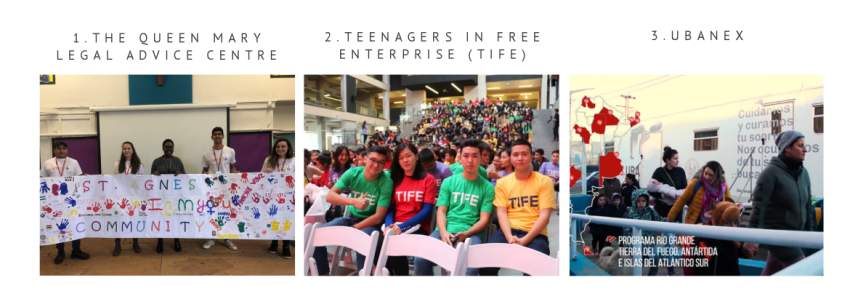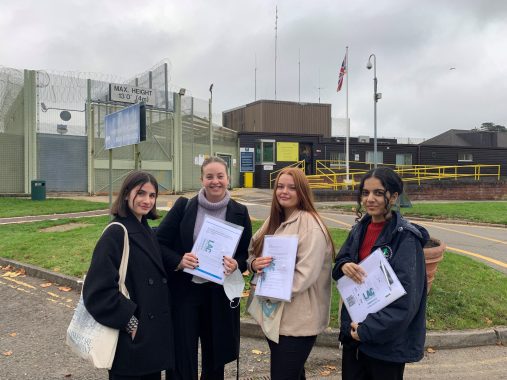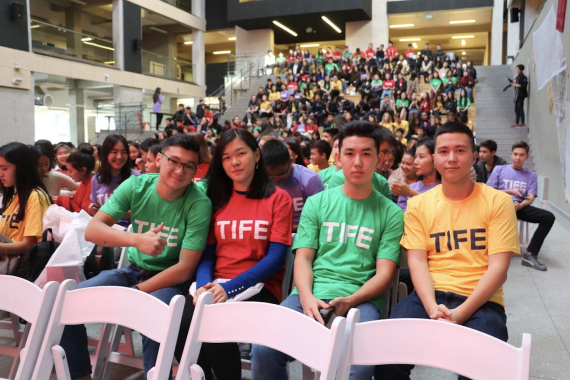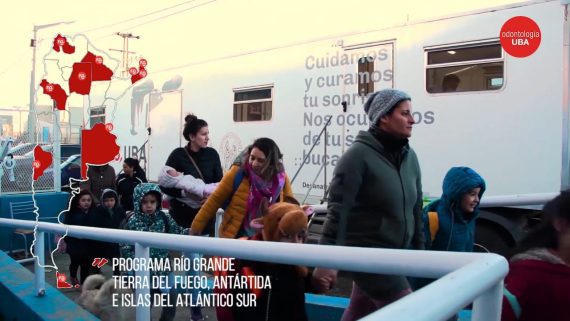2022 MacJannet Prize Winners

About the Winners:

QMLAC students outside of a prison taking part in a community education project
The Queen Mary Legal Advance Centre (QMLAC) is the first-place prize winner of the 2022 MacJannet Prize for Global Citizenship. QMLAC is a free community law centre based in the University’s Law Department. It brings together undergraduate law students, QMLAC staff and volunteer qualified lawyers to provide free legal advice services and public legal education initiatives to the local community. It embodies the University’s own history, one with its roots as the People’s Palace – designed to improve the lives of poor communities in London’s East End, through cultural and educational opportunities. The university continues this educational mission today, using public engagement and service in its daily work. This work has been recognized with the award of a Platinum Engage Watermark from the National Coordinating Centre for Public Engagement.
The location of the QMLAC is a vibrant and multi-cultural area, but one which has significant poverty and need (East London is regularly the lowest scoring area in the Trust for London’s, ‘Poverty Profile’). The Centre was founded by the Law School in 2006 to meet a need for the community to have access to free legal advice. It was the first law clinic of its kind at a London university.
The QMLAC provides free client-centred 1-2-1 legal advice (and sometimes representation) to the public as well as community-based public legal education projects. Qualified volunteer lawyers supervise all work and legal advice delivered by law students. Student opportunities are both curricular and extra-curricular.
The clinical legal education aspect of the centre’s work is providing students with ‘real life’ experience with assisting people who are in need of access to justice, and ensuring they understand and develop a lifelong commitment to the value and importance of pro bono work, for them personally, as well as the wider community. It is a symbiotic relationship where students and clients benefit from engaging with the other.
The QMLAC team has 8 members of staff (funded by the University), in addition to the students and lawyer volunteers. The QMLAC has a volunteer External Advisory Board made up from volunteers in the legal sector, and an internal QMLAC Management Committee comprised of academics within the Department. This ensures proper and appropriate governance and accountability.
The Centre is founded on the principles of excellence, integrity, and ethics. All student opportunities have concurrent reflection classes. QMLAC teaches the ethics of lawyering and instills in students the importance of the special two-way process that they are learning and developing through the opportunity the clients give them to provide legal advice.
“It is such an honour to receive the prestigious MacJannet Prize from the Talloires Network. We want to acknowledge all the volunteer lawyers, and students who donate their time to the work of the Queen Mary Legal Advice Centre; and all the clients who work with us through some of the most vulnerable times of their lives. Queen Mary University of London has built a proud culture which champions civic engagement. Without the continued support of the University and Law School, the mission and work of the Queen Mary Legal Advice Centre would not be possible. We will continue to strive towards enabling access to justice for all educating our future lawyers in the importance of pro bono and community service.”
- Frances Ridout, Director of the Queen Mary Legal Advice Centre
Second Place: Teenagers in Free Enterprise (TIFE), American University of Central Asia (Kyrgyzstan)

TIFE students
The Teenagers in Free Enterprise (TIFE) project is the second-place winner of the 2022 MacJannet Prize for Global Citizenship. The goal of the TIFE project is to create a platform for high-potential high school students and facilitate the development of entrepreneurial skills. TIFE strives to solve the problem of an unequal distribution of income and opportunities between different groups in society. More than half of Kyrgyzstan's population is under the age of 25, and almost a third of the population is between the ages of 15 and 25. Young people in Kyrgyzstan live in an environment where poverty and unemployment are widespread. This has a negative impact on more than 40 percent of young people: economic opportunities are very limited, access to public services is insufficient, and corruption is rampant. This makes 31 percent of young people "fear the future or be unsure of the future."
The TIFE program consists of two parts: Education and Competition. During the educational part of the program, teams of high school students participate in training sessions about business modeling, design-thinking, financial modeling, and also meet with the business owners. In the competition portion of the project, teams compete to win the TIFE annual competition where one of the most valuable prizes is a 35% discount on tuition fees at the American University of Central Asia in the total amount of $34,600 for 6 TIFE winners.
“We are deeply honored to receive the MacJannet Prize for Global Citizenship! Thank you for the opportunity to become a part of Talloires Networks projects and for recognizing the exceptional student community engagement activities within the American University of Central Asia initiative. This award brings a big contribution to the TIFE Accelerator and its development!” – TIFE Program Staff
Third Place: UBANEX, University of Buenos Aires (Argentina)
 The UBANEX Program is the third-place prize winner of the 2022 MacJannet Prize for Global Citizenship. The program was created in 2004, in response to the need for an adequate reference framework for university extension activities carried out at the University of Buenos Aires, defining University Extension as a communicational, educational, cultural and scientific process that articulates teaching and research, and makes possible a transformative relationship between university and society. The University, through university extension and in connection with teaching and research, makes its knowledge available in order to contribute to improving the quality of life of the members of its society.
The UBANEX Program is the third-place prize winner of the 2022 MacJannet Prize for Global Citizenship. The program was created in 2004, in response to the need for an adequate reference framework for university extension activities carried out at the University of Buenos Aires, defining University Extension as a communicational, educational, cultural and scientific process that articulates teaching and research, and makes possible a transformative relationship between university and society. The University, through university extension and in connection with teaching and research, makes its knowledge available in order to contribute to improving the quality of life of the members of its society.
Through the program, a policy scheme was developed that promotes, values, and disseminates the link between the university and the community, creating new knowledge spaces to contain the complexity of the demands of the social environment, assuming the responsibility to interpret, participate, and provide responses in a field of excellence.
The program aims to stimulate social intervention with pre-designed devices, in dialogue with community social actors in the territory and area of influence of the University. These interventions are distinguished by being actions that benefit the target populations and accompany the design, articulation and reformulation of public-social policies with various state and private entities, and that, in all cases, train students guided by teaching teams.
“The University Extension and Student Welfare Secretary of the University of Buenos Aires is infinitely grateful for the award given to our Program. This prioritizes and strengthens us to continue growing and encourages our students and teachers to continue along this path, trying to grow every day in order to contribute to improving the well-being of our society.” - Galli Gustavo J.
"It is an honor to receive this distinction, from our team of teachers and students we are fully grateful, this gives us strength to continue serving the community more and better every day." - Carlos Capuano
Honorable Mentions
The goal of Proyecto INTEGRA is to facilitate the transition and acclimation of refugees entering Spain and to provide support due to the uncertainty of young refugees and their families when facing the challenges of integration in a new society. The program offers opportunities for development by providing professional job training, access to higher education, and promoting an inclusive and supportive mentality as well as critical thinking among the rest of the academic community that makes up the university ecosystem.
The Code4All Initiative, Ashesi University (Ghana)
The Code4All Initiative is a student-founded and led program that aims to empower high school students from underserved communities with software development and critical thinkings skills, thus preparing them to solve real-world problems using the power of technology. The Initiative provides mentorship and teaches basic computer skills and problem-solving through programming to students from rural and underrepresented backgrounds.
The NORTH (Navigating Ottawa Resources To Improve Health) Clinic, University of Ottawa (Canada)
The NORTH Clinic is an interdisciplinary, student-run clinic at the University of Ottawa that aims to understand underserved clients’ self-identified social needs and address them by connecting them to tailored community resources and supports. Through collaborative efforts between students and medical, legal and social work professionals, the NORTH Clinic also aims to train and equip future professionals with the tools to competently and confidently intervene on the social determinants of health.
The Talloires Network would like to recognize the impactful work of all of the finalists for the 2022 MacJannet Prize and we thank all of the nominees. We would also like to thank our international selection committee.
International Section Committee:
Senathirajah Ariyaratnam - Professor of Dental Education and Global Oral Health and Lead for Responsibility in Dentistry and Global Oral Health Initiatives (2021 MacJannet Prize Winner), University of Manchester (United Kingdom)
Luz Avruj - Coordinator of Institutional Relations and Networks, Latin American Center for Solidarity Service-Learning (Argentina)
Peter Kirira - Principal, College of Graduate Studies & Research and Senior Lecturer, Mount Kenya University (Kenya)
Cliona Maher - Latin American Officer and Vice-Chair of the Latin American Regional Working Group (LARWG), University College Cork (Ireland)
Claire McCann – Student and Program Coordinator of Nine Tenths Programme (2021 MacJannet Prize winner), Rhodes University (South Africa)
Catherine Parrinello – Trustee, MacJannet Foundation Board
Achyuta Samanta – Founder, Kalinga Institute of Industrial Technology (2021 MacJannet Prize Winner), (India)
Wenke Thoman – Vice President of Development, MacJannet Foundation Board